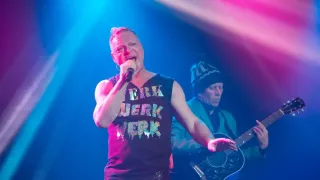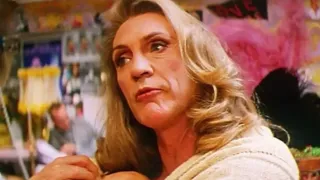September 12, 2015
Gay Leader Marks a Decade at East Bay Jewish Agency
Matthew S. Bajko READ TIME: 6 MIN.
Ten years ago Andrew "Avi" Rose, an outspoken leader in the fight against AIDS during the epidemic's early years, was a stay-at-home dad raising two children with his husband and working part-time as a consultant when he was recruited to be the interim executive director at the Jewish Family and Children's Services of the East Bay.
Initially hired on a temporary basis, Rose, a licensed clinical social worker, and the agency clicked. A decade later the 61-year-old continues to oversee the 138-year-old provider of services not only to the East Bay's Jewish community but a wide array of clients, both LGBT and straight, from children and minority families to seniors and refugees.
"That combination of working within the Jewish community but also within our wonderfully diverse, multicultural East Bay world is really powerful and satisfying for me," said Rose, who lives with his husband, Ron Strochlic, and their children Oren Rose-Strochlic, 13, and Aviva Rose-Strochlic, 12, in Oakland.
Rose is about to preside over one of the biggest changes to the agency during his tenure. In October it will rebrand itself as the Jewish Family and Community Services of the East Bay and debut a new tagline of "Compassion in action. Commitment to all."
Changing that one word in its name, which has been under discussion since the start of the year, will better reflect the vast array of services and people the agency serves, explained Rose during an hourlong interview with the Bay Area Reporter at the agency's offices in downtown Berkeley.
"It is one of the most challenging parts of our job to have the name we have and reach all the people who we want to reach who can benefit from our services," he said. "The new name honors our history, but even more clearly and emphatically, it emphasizes the breadth of who we are. Thirty percent of our clients are Jewish and 70 percent are not."
Rose's ability to connect with people from disparate backgrounds, said Rabbi Yoel Kahn, a gay man who serves on JFCS/East Bay's board and has known Rose for 30 years, makes him ideally suited to oversee an agency working with such a diverse client base.
"Avi is one of these bridge building, connecting leaders," said Kahn, now at Congregation Beth El in Berkeley. He noted that, "Jewish Family and Community Services of the East Bay is largely supported by and rooted in the Jewish community but its clientele is across the community."
The agency continues to serve a large number of Holocaust survivors, said Rose, while the majority of the refugees it has helped to resettle in the area over the last 15 years are Muslims from Afghanistan, as well as Iraq, Syria, and Bosnia.
"We have our own history as Jews needing refuge and having a core value of welcoming the stranger. So we feel strongly about continuing to bring in refugees who need a home, to stand up for them, to stand with them," said Rose, "and to continue to look at who is on the margins, which, I think, is part of our responsibility as gay people too."
As the B.A.R. reported in July, JFCS/East Bay is believed to be the only agency in the country that has developed a specific program to work with LGBT refugees. It began four years ago after a staff member heard the leader of ORAM, the Organization for Refugee, Asylum and Migration, speak at a conference about Iranian LGBT refugees, who had fled to Turkey, needing help resettling in the U.S.
Upon her return, she brought up the issue with her co-workers, recalled Rose, and the agency was soon seeking out financial support to hire dedicated staff to launch the program.
"If not us, who really, given our commitment to refugee resettlement and given the ties we already have to the LGBT community and given my own history," said Rose. "And we are in the Bay Area. This has our name written all over it; we jumped at it."
Since then the agency has worked with a number of LGBT refugees, mostly gay men from Africa and the Middle East. It has enlisted volunteers across the Bay Area to help the newcomers find housing, employment, and social support.
"We do need more people to get involved because the numbers continue to increase," said Rose. "We need for agencies in cities that are not so expensive to get involved in this effort."
JFCS/East Bay is currently seeking more funding from foundations, community groups, and individual donors to expand the support it can provide to LGBT refugees. Unlike the straight refugees the agency works with, noted Rose, the LGBT refugees mostly come to America alone with little to no family support and lacking community support among their compatriots already in the Bay Area due to homophobia.
"For gay refugees, they are not coming with families, they are coming by themselves. They can't generally turn to their national communities because of homophobia, so it is up to us," said Rose. "It is up to our staff, our volunteers, the LGBT community, and our allies, which are many, to fill that need and give people a foundation to start their new lives."
The three key issues LGBT refugees face in the Bay Area, said Rose, are housing, employment, and mental health services due to the trauma and discrimination they have faced.
"The housing is huge and getting some more money in to help us, for example, rent some apartments or transitional housing so we are not always relying on volunteers to open up their homes would be extremely helpful," he said. "So that is one of the things we are working on."
According to its most recent tax filing, for the 2012-2013 fiscal year, JFCS/East Bay had revenues of nearly $4 million, with a small surplus after expenses of roughly $60,300. Rose earned $125,000.
The agency's fiscal picture was the polar opposite when Rose was first hired, said Kahn.
"Like a lot of nonprofits, it was a struggling agency when he arrived with a great mission and very committed people but a lack of infrastructure and resources," he said. "The question he faced is how do you build a nonprofit so it is faithful to its mission and is better situated and has the resources it needs to do well in an enduring fashion?"
Rose was able to balance the interests of the agency's funders and donors on one hand, said Kahn, and on the other the needs of the people it is trying to reach.
"He is incredibly graceful in balancing all those things and being able to listen to all the stakeholders," said Kahn. "Avi is a great example for us of a first generation out gay leader who has been an advocate and spokesperson for visibility throughout his career and has also been serving and bringing that whole self to a wider community and the bigger social service field."
Bringing Together Experiences
Leading JFCS/East Bay, said Rose, allows him to tap into various aspects of his past life and work experiences.
After graduating Brandeis University in 1976, Rose earned an MSW from the University of Southern California and a Master of Arts in Jewish communal service from Hebrew Union College.
He worked for the Jewish Family Service in Los Angeles and then was hired by the Jewish Family and Children's Services in San Francisco where he launched the first AIDS program within the Jewish community.
Later, Rose served as the executive director of Project Inform, the national HIV treatment information and advocacy organization based in San Francisco. In 1989, he co-edited the anthology Twice Blessed: On Being Lesbian or Gay and Jewish.
"For me, and so many of us in my generation, AIDS took over our lives," recalled Rose.
Nowadays, with a new generation of LGBT leaders coming of age, Rose said he has stepped back from serving in a public role as a gay Jewish leader and prefers to see others' voices be heard.
"I am proud of what we did. I think we had a really good impact on the Jewish community, in particular in giving people a reference point," said Rose when asked about his being an out role model in the Jewish community. "There was a period of time, in the late 1980s into the 1990s, where I did a ton of speaking in the Jewish community all over, partly about HIV issues and partly about LGBT issues. It was really the center of my life and my work. It's gotten less true over time because more people are out and there are new leaders."
Being in his 60s has particular relevance for Rose, having seen so many gay men's lives be cut short by AIDS.
"There is something about being a 61-year-old gay man that is very special. I am part of the generation that survived," he said. "For me to have the privilege of aging is profound to me. Many of us weren't able to do that."
JFCS/East Bay's major fundraiser, Art of Living, will take place Sunday, October 11. This year's featured speaker is gay author, critic and essayist Daniel Mendelsohn. For ticket information, visit http://jfcs-eastbay.org/event/art-living-2015






